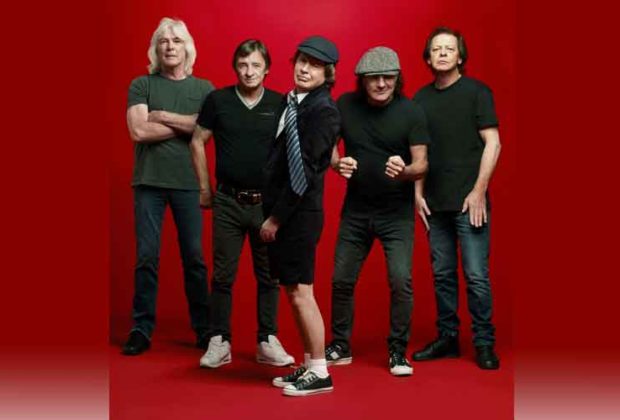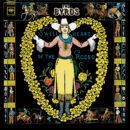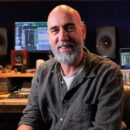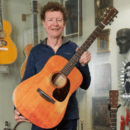When AC/DC wrapped up its Rock or Bust World Tour four and a half years ago in Philadelphia, things were not exactly a whole lotta rosey. It had been an arduous campaign, to be sure––AC/DC’s own highway to hell, if you will. It started before the 2014 release of the Rock or Bust album, when it was revealed that Malcolm Young, who co-founded the band and wrote its songs with older brother and fellow guitarist Angus Young, had retired and was battling dementia (he passed away during November of 2017 at the age of 64). And drummer Phil Rudd had to take a leave due to legal issues in New Zealand, where he resides.
During the tour, meanwhile, frontman Brian Johnson dropped out due to hearing issues and was replaced by Guns N’ Roses’ Axl Rose for 2016 legs in European and North America. And once the tour wrapped, bassist Cliff Williams (who’d been with AC/DC since 1977) announced he was retiring. There was justifiable reason to wonder if we’d ever see the iconic Australian rock band again. But anyone who’s paid attention over AC/DC’s 47 years knows it’s not a band easily counted out.
Proof positive of that came with the recent release of Power Up, the band’s 17th studio album. Recorded quietly in Vancouver with producer Brendan O’Brien, the 12-song set of prototypically Spartan, hard-hitting heavy rock finds Johnson (thanks to groundbreaking hearing aid technology), Rudd and Williams back in the fold and songs again written by the Young brothers from riffs they’d been working on before Malcolm’s death. (Their nephew, Stevie Young, remains in his stead since 2014.)
The new release debuted at No. 1 on album charts in more than 18 countries––including the Billboard 200 in the U.S.––while the singles “Shot in the Dark” and “Realize” vaulted to the top of Billboard’s Mainstream Rock Songs survey. Absence indeed made hearts grow fonder, though with its ubiquitous airplay AC/DC has never really been absent from its fans hearts, or ears, for several decades now...
Music Connection: Were you at all surprised at how powerfully Power Up came out of the box?
Angus Young: I don’t think you can take anything for granted. You always hope it’s gonna be accepted, but...the public’s their own, y’know. I mean, the Romans were saying to the mob, y’know what I mean? The mob. You never know when the mob can go the other way.
MC: There were a lot of people who thought we’d maybe seen the last of AC/DC after the last go ‘round. Were you always confident there was more on the horizon?
Young: To be honest with you, I didn’t know. I had a little bit of a break, and then I thought, “Well, I’ll start doing some work,” which I’d always done. I always go to my little room and try to put together some ideas. There were a lot of ideas that Malcolm and myself had done through the years, which was a lot of great AC/DC song ideas we always had meant to record, but usually when it comes to doing one record you go, “Okay, we got this amount of songs” and this group of songs might have missed out because of what we had already done. So this time I went through a lot of the older stuff to see what was there.
MC: At what point did you start to feel like there was another AC/DC album on the horizon?
Young: I think it was mainly our management who more or less got the ball rolling. They were asking when are we gonna get together, or “Are you gonna do an album or what?” I had said, “Well, I’m just still going through some ideas,” and they said, “Do you want us to contact anyone?” I said, “Yeah, let’s see who wants to be on board. See if Brian and Cliff and Phil and Stevie, would they like to be participating in it?” And everyone was pretty eager to be involved, so that was a good sign.
“Malcolm is in every song. He was in the studio, and I’m not talking spooky and stuff like that. Malcolm was there.”
MC: How did that go down on your end, Brian?
Brian Johnson: Yeah, I first heard from management; they just said, “Would you like to do an album?” and I just said, “Absolutely! I’d love to,” ‘cause I hadn’t been around music for two and a half years, and you really miss it. And then Ang had a great pot of songs, let’s put it that way, and Phil was gonna be back and good ol’ Cliff was gonna be there and Stevie was coming in, so it was like the family. Back together again, obviously excited to get back in the studio.
MC: Was it like riding the proverbial bike?
Johnson: Oh, yeah. When we all got there, Vancouver, it was just that feeling in the room, that positive feeling and excitement and electricity that comes with people who had worked together for most of their adult life but hadn’t seen each other in a while. You get in the studio and the boys just powered up those amplifiers and started hitting the guitars and everybody was in, hook, line and sinker. They just loved it. It was a wonderful way to see the bond within the band was still strong. I was just so happy, I really was.
MC: There was a lot of doubt about the rhythm section, Cliff and Phil, and Cliff had even announced his retirement after the last tour. Was it surprising to get them both back on board.
Young: It was really, I guess, just part of the thing, y’know? You’re right about Cliff, ‘cause he was saying he was gonna retire and everything. But he had said if I was going to do something to let him know, so I did and I said, “If you want to be on board, y’know...no pressure. It’s up to you if you want to do it, and he was, “Yeah! I’ll be there.” He was wanting to be involved, so that was great.
MC: And Phil?
Young: I’d also communicated a few times with Phil and he came to Mal’s funeral, and he was in very good shape. He had managed to get a lot of his problems sorted out and he was in good, healthy condition and, like Brian said, he was rarin’ to go. He was, “Yeah, I’m there, ship shape. You tell me when and I’ll be there with bells on.”
MC: Power Up is very much an AC/DC album––which is a compliment. You have a sound and you’ve stayed with it, unapologetically.
Young: It’s just...how we sound, y’know? When people would say to Mal, “All your albums sound the same” he would say, “Yeah, it’s the same band.” (chuckles) Even when we started, we weren’t trying to reinvent the wheel. We just wanted to be a rock ‘n’ roll band. My older brother George (formerly of the Easybeats) produced a lot of what we’d done in the beginning, and he always said, “You’re just a guitar band. The guitars are so dominant in what you do.” He always saw that as a big plus factor, that the guitars were so strong. So we’ve just stayed with that. It’s just a groove.
MC: But it’s not an easy thing to do––at least not successfully.
Young: Everyone listen to it and thinks, “Oh, it’s simple,” but it’s not. Even if it’s a straight eight or something, keeping it solid and even, that’s not a simple thing to do. That was Mal’s thing, and Cliff’s the same, very solid. But there’s the clever things, too––a different note here or there. Even though it’s straight, major guitar chords or something, underneath you get, like, a harmony note that just changes up the whole thing. His role is to make it come together and make it swing, and that’s a big part of the sound, too.
MC: It goes without saying, almost, but Malcolm is a big part of this album just like he was on (2014’s) Rock or Bust, even if he wasn’t in the studio with you.
Johnson: Malcolm is in every song. He was in the studio, and I’m not talking spooky and stuff like that. Malcolm was there. He was such a strong character in life, and it seems to have just passed on. He’s just there. I’m sure there’s not a guy in the studio that didn’t turn around and think of Mal, ‘cause that’s his legacy, with Angus––it’s the band. I think we all felt it. You cannot help it, and it’s in the songs as well. Angus knows what that feels like, because he was very, very close to his brother.
MC: What kind of emotions did you feel as you were dipping back into all those old song ideas you had created with Malcolm.
Young: At the time, especially after his death and everything, it was very hard. And it was very hard before that ’cause it’s a hard thing to go through. I wouldn’t wish it on anyone to go that route. But (Malcolm) himself, while he could still communicate, would say, “I know I’m gonna try...,” and he was trying to get himself through. He thought maybe he might get through it, but unfortunately didn’t come to pass. So he was always pushing, even as he said to me, “You got to keep writing, deep doing it...”
MC: There’s a kinship between Back In Black, which came out of the death of (frontman) Bon Scott, and Power Up 40 years later.
Young: Well, they are alike in that respect because Back in Black was a tribute to Bon Scott, and it was our way of paying our respect to him. Even the color of it, we did it in black because it’s the mourning color, for people in mourning. And this album was for Mal. I thought, “Malcolm always liked things very simple and straight,” so I just thought we’ll put a little candle (on the cover) and let him know that the album was for him.
MC: What was the timing for the song ideas?
Young: A lot of them are from just before we did (2008’s) Black Ice. We’d had a lot of years, a lot of time, a lot of space (between albums) and we had gotten together for quite a bit of time working together and going through a lot of ideas and coming up with new ideas for new songs. So a lot of songs came from that period––in fact, when we went to do the Black Ice album we had so much stuff it was like we started on the first [album], coming out of the box with ideas, and there were just piles of boxes to go through.
MC: How did the two of you write together?
Young: In different shapes, really. Sometimes it was a case of we’d have just the two guitars, or Mal would go out and put a quick drumbeat down, then we would drop on a couple of guitars and a bass. And then other times Malcolm would just hop on the drums while I was playing a riff and bang down a quick drumbeat, playing along with me. Sometimes he’d come in and get the bass and we would knock around a little bit of bass while I played guitar, or vice versa. Or if he was really desperate (laughs), ‘cause he knew how lousy a drummer I was, he’d go, “You hop on the drums” and then he’d get on his guitar and do a bit of rhythm.
“Underneath you get, like, a harmony note that just changes up the whole thing.”
MC: This is the third album you’ve made with Brendan O’Brien. What makes that relationship work so well?
Young: Brendan...he knows how to work with bands, really. And he’s a musician, too. He gets me in and he’ll just say, “Okay, let me hear” and I’ll do a rough kind of thing of what I’ve done––and of course Malcolm had knocked out a few little melody ideas, so I’m relaying some of that as well and I try to copy what Mal did.
Then I put that through to Brendan and we just run a track and he’ll let me do a scratchy vocal thing and then he’ll translate it for Brian. Then he’ll say to me, “Is this what you’re hearing? Is that what you want?” and once we’re set he’ll get Brian running. And while Brian’s doing that he’ll get the rest of us in the other studio and be like, “Okay, let’s get another new track down. Work it up,” and then he’ll come back in when we’re ready to start putting down the track. He keeps everyone busy, which is a good approach, because it gives everyone something to do and there’s no sitting around bored.
Johnson: At the end of the day you have to do the lyric and sing the song the way Angus imagines it in his mind. When I’d be doing the vocals, Brendan and Angus would sit over them, even to the point of just changing a couple words to make it flow easier. You have to try to get as close to that as you can, and if that works, well, fuckin’ bingo, y’know?
MC: There are a couple of songs that fit well with 2020, even though you recorded them the year before.
Johnson: Yeah, like “The Mists of Time.” I still get a bit of goosebumps when I hear that, even now. And “Code Red” and “Systems Down,” too. It’s just kind of spooky sometimes when you look at some of these and it looks like we already knew what was coming. But the main thing is it’s upbeat, and that’s what we need right now. The songs just get your toes a’tappin’. I had a ball doing [the songs]. There were some nice little tricky ones to get through. That just makes it exciting when you’re doing them, a challenge. A good challenge.
MC: Does all feel right with the world when Brian’s the voice of AC/DC again?
Johnson: It’s just a brilliant feeling. There’s not many things that can make you as excited as you were when you were young, but this did. This is right up there with any of the great things I’ve done in life, right up there on the top. Getting back and just feeling part of it, being back with your family, it was just brilliant. It’s the one thing I’ve always loved doing.
MC: One thing AC/DC also loves is playing live. No one knows when that will happen, but have you allowed yourself to think about what your next show might look like and how the Power Up songs will fit into the set?
Johnson: The thing is we can’t even plan to make plans at the minute. It’s bloody frustrating. I don’t think we’ve even got to the stage of basic ideas for the stage; I’m sure they’ve got ideas in the back of their heads, but [the Covid-19] pandemic just came and put everybody on the skids. We were already having a cracking time rehearsing together in Holland, all just rockin’ and rollin’ all this stuff like we’re supposed to do and getting excited about the prospect of going out [on tour]. Then about three days after we left, all the shit hit the world. It was crazy.
Young: We’ve been in rehearsal and tried out a few of the new things. Of course Brian had new ear-specialist people working with him, and he wanted to know if it was gonna work out live and he was really happy with the results and having a ball. We were running through a lot of old tracks, a couple of these newer ones each day. It was a good test to see if everything was gonna work live, and it really helped Brian. He got to see how the new technology and stuff they’d been working on would be. He was really happy with everything the way it was going, so it was working out great, very positive.
Johnson: We’ll obviously be the first ones to get out there, when there’s a chance.
Young: We can keep our fingers crossed, that we all get through it, and as soon as you get the all-clear and we’re back to normal I’m sure we’ll get a chance to get out and perform again.
MC: In the meantime, are there enough other ideas in the batch you drew from to maybe start work on the next AC/DC album sooner than later?
Young: There’s a lot of ideas and stuff, yeah, that I’ve still got, in different shapes. We’ll see. When we first started working together, my older brother [George] who was working with us––he was producing us, him and Harry Vanda––he used to always say to me and Malcolm, “You’ll always save yourself a whole heap of time if you make sure you’ve got good ideas ready to go when you go in the studio.” He always said if you were prepared before you got in, all you had to do was get the sound you wanted and hit the [record] button. You didn’t really have to concentrate so much on the songs––maybe the odd tweak here and there. But if you had ideas around, you didn’t have to be under pressure to come up with 10 or 11 good tracks all at once. That was good advice that we followed, so that’s why there’s a lot of stuff around.
Contact kimberly.harris@sonymusic.com
Photos by Josh Cheuse
QUICKFACTS
• AC/DC started during 1973 in Sydney, Australia.
• The name was inspired by a power supply message on a sewing machine.
• Its first two albums, High Voltage and T.N.T.––both 1975––were released in Australia only before an international High Voltage a year later combined tracks from both.
• The group’s lineup has included 20 members. Guitarist Angus Young is the only founding member.
• Its top-selling album, 1980’s Back in Black, has been certified 25 times platinum in the U.S., with more than 50 million copies sold worldwide––the third highest-selling album by any act.
• AC/DC has sold more than 200 million albums worldwide.
• The group has won one Grammy Award––Best Hard Rock Performance for “War Machine” in 2010––and three ARIA Awards in Australia.
• AC/DC was inducted into the Rock and Roll Hall of Fame in 2003, and into the ARIA Hall of Fame in 1988.
• Current rhythm guitarist Stevie Young, who joined AC/DC in 2014, is the nephew of Angus and the late Malcolm Young, the son of their oldest brother, Stephen Young Sr.
• Their latest, Power Up, is the group’s 17th studio album. It debuted at No. 1 in over 18 countries after its recent release.












